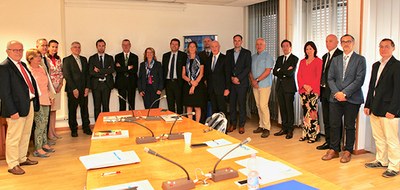New NATO project to help with real-time detection of explosives in public transport
21/6/2018
 A new NATO project, EXTRAS, led by research institutions in Italy and Serbia, will make it possible to detect explosives and prevent terrorist attacks on public transport. The project, funded by NATO’s Science for Peace and Security (SPS) Programme, will use laser spectroscopy to identify explosive materials on potential bombers.
A new NATO project, EXTRAS, led by research institutions in Italy and Serbia, will make it possible to detect explosives and prevent terrorist attacks on public transport. The project, funded by NATO’s Science for Peace and Security (SPS) Programme, will use laser spectroscopy to identify explosive materials on potential bombers.
The project started on 14 June 2018 in Rome. Led by the Italian National Agency for New Technologies, Energy and Sustainable Economic Development (ENEA) and the Vinca Institute of Nuclear Science in Serbia, it also includes institutions from Germany (ICT Fraunhofer), the Netherlands (TNO), Italy (the Urban Transport Operator of Roma Capitale and Forensic Police Service) and Ukraine (the National Technical University of Ukraine).
“ENEA has been engaged in security activities for years at international level, representing a center of excellence in the sector. Now, the leading of this NATO project represents for us the confirmation of the right direction of our efforts in such a strategic area for safety and security of citizens“, said Federico Testa, President of ENEA.
 Italy is a longstanding supporter and one of the main contributors to the SPS Programme, having participated in around 30 initiatives since 2014.
Italy is a longstanding supporter and one of the main contributors to the SPS Programme, having participated in around 30 initiatives since 2014.
The project is part of a NATO initiative to develop a system capable of detecting explosives and concealed weapons in real time and securing mass transport infrastructure, such as airports and metro and railway stations. The initiative also includes a project on microwave scanning technology, led by France, the Republic of Korea and Ukraine.
